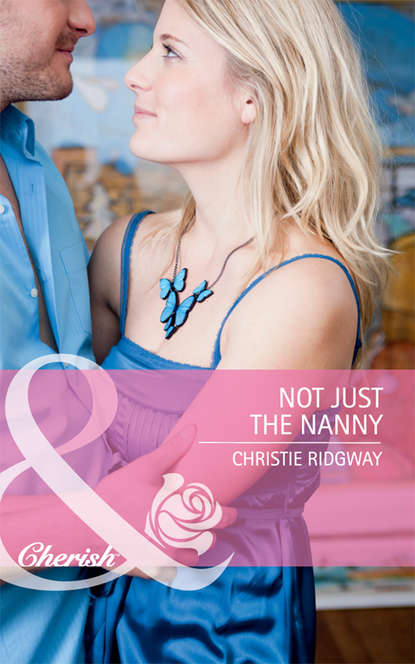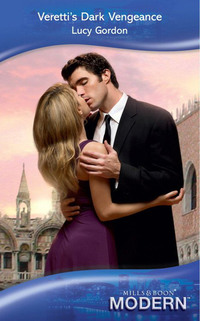
Полная версия
The Mediterranean Rebel's Bride

The Mediterranean Rebel’s Bride
Lucy Gordon

www.millsandboon.co.uk
MILLS & BOON
Before you start reading, why not sign up?
Thank you for downloading this Mills & Boon book. If you want to hear about exclusive discounts, special offers and competitions, sign up to our email newsletter today!
SIGN ME UP!
Or simply visit
signup.millsandboon.co.uk
Mills & Boon emails are completely free to receive and you can unsubscribe at any time via the link in any email we send you.
CONTENTS
CHAPTER ONE
CHAPTER TWO
CHAPTER THREE
CHAPTER FOUR
CHAPTER FIVE
CHAPTER SIX
CHAPTER SEVEN
CHAPTER EIGHT
CHAPTER NINE
CHAPTER TEN
CHAPTER ELEVEN
CHAPTER TWELVE
CHAPTER ONE
‘I, CARLO, take you, Della, to be my wife. I promise to be true to you in good times and in bad, in sickness and in health. I will love you and honour you all the days of my life.’
On a bright summer day in Naples, Carlo Rinucci uttered these words in the Church of All Saints and Angels. He spoke with his eyes fixed on the bride he had fought so hard to win, and behind him a quiet murmur went round the congregation.
His best man and twin brother, Ruggiero, stood quietly, waiting for the service to be over. This wedding was an unsettling experience for him.
For thirty-one years the twins had squabbled, enjoyed themselves together in various over-indulgent ways, played truant, chased girls. Though not identical, they were alike in their conviction that the race went to the swift and life was meant to be fun—and they had always acted as they were: handsome young bachelors with the world at their feet.
Now here was Carlo, dedicating himself, with quiet gravity, to a woman of frail health, seven years his senior, and doing so with the air of a man who had finally come to the place his heart desired.
Ruggiero played his part at the church perfectly, performed all his duties, then went home to the reception at the Villa Rinucci to eat and drink, flirt, and cope with the usual hearty wedding jokes,
All the Rinucci brothers were handsome, but Ruggiero had something else—the kind of outstanding looks that made him a target at weddings. A ripple would go around the female guests, combining fascination and a mysterious sense of outrage, as though no man who looked like that had any right to be on the loose.
It had been his trademark all his life: looks and charm, both with a slightly fierce edge that turned heads. He knew what was said of him, that he could have any woman he wanted, and although he enjoyed the joke he accepted it as his due.
Any woman he wanted.
Except one.
‘Only you and Francesco left now,’ someone said. ‘I guess your mother’s making plans.’
He laughed, saying, ‘They won’t get me.’
‘You say that at every wedding,’ observed his brother Luke, who was passing.
‘You used to say it at every wedding,’ Ruggiero reminded him. ‘The difference is that I’ve held out. I’m a shining example.’
Luke paused long enough to wave to Minnie, his wife of two years, who waved back between sips of champagne.
‘Just beware,’ he said to Ruggiero, ‘lest one day the shining example wakes up to find he’s a lonely old man. Coming, cara.’
Ruggiero grinned, accepting this as just one of those things brothers felt obliged to say at weddings, and returned to his duties, flirting with a shy young woman until she laughed and began to enjoy herself.
When it was time for the speeches he did an excellent job, even if he said so himself—which he did. He was rewarded with looks of gratitude from Carlo and Della, and a smile of fond approval from his mother.
‘You’re a wonderful best man,’ she said afterwards.
‘Against all your expectations?’ he teased.
‘The only thing that surprises me,’ Hope informed him, ‘is that you don’t have some over-painted young hussy clinging to your arm.’
‘I didn’t want any distractions when I had a job to do,’ he explained blandly.
‘Hmm!’
‘Don’t be so cynical, Mamma.’
‘Don’t be—? I have six sons, and you’re surprised that I’m cynical?’
He grinned, and glided away to attend to the needs of a Rinucci great-aunt.
‘Be fair to him,’ Evie said, appearing at Hope’s side.
She was the wife of Justin, Hope’s eldest son. Before their marriage she’d been a natural rebel, caring only for her motorbike. Happy marriage and the birth of twins had softened some of Evie’s glittering edge, but had done nothing to dull the gleam of humour in her eyes.
‘It’s reasonable for Ruggiero to want to concentrate on his duties,’ she said now.
‘Reasonable?’ Hope echoed. ‘This is Ruggiero we’re talking about.’
‘I take your point,’ Evie said with a laugh.
‘When was he ever reasonable about anything? Working, playing, eating, drinking, hussies—everything over the top.’
‘Surely his girlfriends aren’t all hussies?’
‘He doesn’t let me meet most of them. That’s how I know.’ Hope sighed fondly. ‘Evie, it’s such a pity you can’t split yourself in two—one for Justin and one for Ruggiero.’
‘Maybe I wouldn’t suit Ruggiero.’
‘You’re bound to. You’re as crazy about motorbikes as he is.’
‘Is it true that he actually owns a firm that makes them?’
‘Half-owns.’
‘Maybe I should go and talk to him,’ Evie said, laughing, and sauntered away.
It was later that evening when she caught up with Ruggiero. The guests had gone, and those family members who were staying at the villa had settled into small groups to enjoy a good natter. Justin was deep in conversation with his mother, and Evie found Ruggiero on the terrace, looking out over the lights of Naples gleaming against the darkness. With a sigh of relief she threw herself into a chair and kicked off her shoes.
‘Weddings are exhausting,’ she said.
He nodded. ‘And there’s another party tomorrow night. Mamma’s never happier than when planning a big get-together. I’m going to spend the day peacefully testing a bike.’
‘Ah, yes—tell me about your factory.’
He poured her a glass of wine, and sat on the low wall.
‘I found the place on its last legs a couple of years ago. I knew Piero Fantone—the owner—slightly, and I bought in. Things have gone well. Our bread and butter is the standard bikes that “normal” people buy, but the specials are the racing bikes that only the “crazies” want. We’ve started winning races. Now we’re bringing out a new racing bike, and I’m testing it tomorrow.’
‘The fastest, hottest, most fearsome bike in the country,’ Evie declaimed theatrically.
‘Do you mind?’ he said at once, in mock offence. ‘In the world.’
‘I’m sorry. But aren’t there professional testers? Does the boss have to risk his neck—?’ She broke off and struck her forehead. ‘Oh, of course! Stupid of me. You want to risk your neck. Otherwise, where’s the fun?’
‘You’ve got it.’ He grinned. ‘Evie, you’re the only woman I know who’d understand that. You should come and watch tomorrow.’
‘I’d love to.’ She sipped her wine and said mischievously, ‘People have been talking about you all day.’
‘I know. It’s a bachelor’s fate at a wedding.’ He assumed a twittery voice of the kind he’d heard so often that day. ‘“He’ll be next. Just wait and see.”’
‘Was that why you didn’t bring a date?’ she asked, chuckling.
‘One reason. My mother complains about the girls I bring home, and when I don’t bring one she complains even more.’
‘I gather they’re real eye-openers?’
He made a wry face, and she became serious to say, ‘I guess you’re a long way from finding what Carlo has.’
‘I think there are very few men who find what Carlo has. Or what you and Justin have.’
She was silent, watching him sympathetically.
After a while he added, ‘And thank you for not saying, Don’t worry, your turn will come.’’
‘Don’t you think it will?’ she asked, struck by the sudden quiet heaviness in his voice.
‘Maybe. Or maybe it came and went.’
Evie was silent, astonished. She had always sensed that there was more to her brother-in-law than the rough, hard-living man he was on the surface, but this was the first time he’d offered so much as a hint of a more reflective inner self.
Cautiously, so not to scare him off, she said, ‘Can you be sure that it’s gone finally?’
‘Quite sure. Since I know hardly anything about her. She was English, her name was Sapphire, and we had two weeks together. That’s all.’
But it wasn’t all, she could tell. During those weeks something had happened to him that had been like an earthquake.
‘Do you want to talk about it?’ she asked.
‘I met her in London about two-and-a-half years ago. I was visiting friends, but they suddenly had a family crisis, so I left them to it and explored London on my own. We met in the bar of my hotel. She was there to meet a friend who didn’t show up, we got talking and—that was it.’
‘What was she like?’
‘Like something from another world. So insubstantial that I was almost afraid to touch her. I knew her for two weeks, and then she vanished.’
‘Vanished? Where?’
‘I’ve no idea. I never saw her again. Perhaps she was nothing but a mad hallucination?’
Evie was astonished. Who would have thought the hardheaded Ruggiero could talk in this way? She wondered if he even realised what he’d revealed. He was looking into the distance, his eyes fixed on some inner world. She held her breath, willing him to go on.
But instead he made a sound that was part-grunt, part-nervous laugh, seeming to draw himself back from the brink.
‘Hey, what the hell?’ he said edgily. ‘These things happen. Easy come, easy go.’
‘But I don’t think it was easy,’ Evie urged. ‘I think she meant more to you than that.’
He shrugged. ‘It was a holiday romance. How much do they ever mean?’
‘Ruggiero—’
‘Do you want to come with me tomorrow or not?’
‘Yes, of course. But—’
‘Fine. Be ready to leave early in the morning.’
He bid her goodnight and hurried to his room, despising himself for making a cowardly escape, but unable to help it. Much more of that conversation and he would have gone mad.
He stripped off his clothes and got under the shower, hoping to wash away the day. But nothing could banish the thoughts that had troubled him from the moment he’d arrived at the church with Carlo.
Carlo, the twin barely an hour younger than himself, who’d shared with him all the riotous pleasures of youth, now transformed into a man lit by a powerful inner joy. And the sight had thrown him off balance because it had called up a voice he’d thought he’d silenced long ago.
‘Forget the rest of the world—there’s only our world—what more do we need?’
Memories started to crowd in. She was as he’d first seen her, in a glittering tight red dress, low enough in front to show her exquisite bosom, high enough on the thigh to show off her endless legs. It was the attire of a woman who could attract men without trouble, who enjoyed attracting them and had no scruples about doing so as often as she pleased.
Within a few hours of their meeting he’d held her, naked, in his arms. Everything about her had been breathtaking—her body, the whisper of her voice, her laughter.
Other pictures crowded in: a day out together at the funfair, doing childish things. They’d sat together in a photo booth, arms entwined, heads leaning against each other, while the machine’s lights flashed. A moment later two pictures had appeared in the dish, and they had taken one each.
‘Sapphire,’ he murmured.
It was the only name she had ever told him. She’d kept her last name a secret, and even that had been part of her magic.
Magic. He’d resisted the idea, considering himself a prosaic man and proud of it. But Sapphire had burned with erotic power, dazzling him and luring him into a furnace from which he’d emerged reborn.
She’d been an adventurous lover, who hadn’t tamely waited for him in the bed but had come after him eagerly, appearing in the shower and sliding her arms around him as water laved them. How many times had he seen her shadow outside the frosted glass, then felt her beside him?
The last memory was one from which he still shied away. They’d made love in the afternoon and she’d left him in the evening, promising to return in the morning. He’d lain awake that night, vowing to bring things to a head the next day.
But the next day there had been no sign of her.
He’d waited and waited, but she hadn’t appeared. One day had become two, then three.
He had never seen her again.
Now he stood in the shower, his eyes closed, keeping out the world. But at last he opened them and switched off the water.
Then he tensed.
She was there, just outside the shower, her shadow outlined on the glass. She was waiting for him.
He moved fast, hurling himself against the glass so hard that he nearly broke it, reaching out, trying to find her.
But his hands touched only air. There was nobody there. She had been an illusion as, perhaps, she had always been. He stood there alone, shaking with the ferocity of his memories.
He dried himself mechanically, trying to force himself to be calm. It shamed him to be out of control.
That was the mantra he’d lived by since the day she’d vanished into thin air. Control. Never let anyone suspect the turmoil of joy and misery that had destroyed and remade him.
He’d returned to Italy, apparently the same man as before. If his rambunctious hard living had been a little forced, his manner more emphatic, nobody had seemed to notice. He had kept his memories a secret, sharing them with nobody in the world—until tonight.
With Evie he’d come closer to confiding than with anyone else, ever. But he wasn’t a man who easily discussed feelings, or even knew what his own feelings were much of the time. So he’d gone just so far before retreating into silence.
Today, at his brother’s wedding, he’d sensed that Carlo had found a secret door and gone through it, closing it behind him.
For him the door had stood half-open, but then it had brutally slammed shut in his face, leaving him stranded in a desolate place.
All around him the villa was hushed for the night. It was packed to the rafters with people—many of whom loved each other, some of whom loved him. In the midst of them he felt lonelier than ever before in his life.
The flight from London had been delayed, and by the time Polly landed at Naples she was feeling thoroughly frazzled. The extra time had given her more chance to think about what she was doing and regret that she had ever agreed to do it.
There was a long queue to get through Passport Control, and she yawned, trying to be patient. A large mirror stretched the length of the wall, providing an unwelcome opportunity to anyone who could bear to look at themselves after a flight. For herself, she would gladly have done without it. There was nothing in her appearance that pleased her.
It was wickedly unjust that, equipped with much the same physical attributes as her cousin Freda, she had turned out so differently. Freda had been tall, slender, willowy—a beauty who’d walked with floating grace. Polly was also tall and slender, but her movements suggested efficiency rather than elegance.
‘And just as well,’ she’d tartly remarked once. ‘I’m a nurse. Who wants a nurse drifting beautifully into the ward when they need a bedpan? I run, and then I run somewhere else, because someone’s hit the alarm button. And when I’ve finished I don’t recline gorgeously on a satin couch. I collapse in an exhausted huddle.’
Freda, who’d been listening to this outburst with amusement, had given a lazy chuckle.
‘You describe it so cleverly, darling. I think you’re wonderful. I couldn’t do what you do.’
That had been Freda’s way—always ready with the right words, even if they’d meant nothing to her. Polly, prosaic to her fingertips, had seen that slow, luxurious smile melt strong men, luring them on with the hint of mystery.
To her there had been no mystery. Freda had done and said whatever would soften her audience. It had brought her a multitude of admirers and a rich husband.
Polly had even watched helplessly as a boyfriend of her own had been enticed away from her, without a backward look. Nor had she blamed him. She hadn’t even blamed Freda. It would have been like resenting the sun for shining.
Freda’s heart-shaped face had been beautiful. Polly, with roughly the same shape, just missed beauty by the vital millionth of an inch. Freda’s hair had been luxuriously blonde. Polly was also fair, and could probably have had the same rich shade if she’d worked on it. But life as a senior nurse in a busy hospital left her neither time nor cash to indulge her hair. She kept it clean and wore it long, her one concession to vanity.
Trapped in the slow-moving queue, she had plenty of time to consider the matter and come to the usual depressing conclusions.
‘I look like I’ve been left out in the rain by someone who’s forgotten. But is that so strange, after the way I’ve spent the last year?’
At last she was out, and searching for a taxi to take her to the cheap hotel she’d booked on-line, which was all she could afford. It was basic, but clean and comfortable, with friendly service. Judging it too late now to start her search, she dined in the tiny garden restaurant off the best spaghetti she’d ever tasted. Afterwards she showered and stretched out on the bed, gazing at the snapshot she’d taken from her purse.
It was a small picture, taken in a machine, and it showed Freda, gorgeous as always, sitting with a young man in his late twenties. He had dark hair that curled slightly, a lean face and a stubborn mouth. Freda was leaning against him, and his arm was about her in a gesture of possessiveness. His cheek rested on her head, and although he was half smiling at the camera it was clear that the rest of the world barely existed for him.
Polly studied him, trying to decide why, despite his air of joy, there was a kind of fierceness about him that defied analysis. He seemed to be uttering a silent warning that Freda belonged to him, and he would defend his ownership with his last breath.
But it hadn’t worked out like that. He had lost her for ever. And soon he would know it finally.
For a long time Polly lay looking at the ceiling, musing.
What am I doing here? I don’t really want to see Ruggiero Rinucci, and I’m sure he doesn’t want to see me.
Maybe I should have written to him first? But I don’t have his exact address. Besides, some things are better face to face. Plus, men are such cowards that if he knew why I was coming he’d probably vanish. Oh, heavens, how did I get into this?
On the edge of Naples stood La Pista Grande, a large winding track that was the scene of many motorbike races.
Here, too, the firm of Fantone & Rinucci tested their motorbikes, with Ruggiero insisting on doing all tests personally, and taking every machine to the limit.
‘If it doesn’t half kill him he thinks there’s something wrong with it,’ one of the mechanics had remarked admiringly, and when Ruggiero was on the track as many as possible of the workforce turned out to watch, cheer and take bets on his survival.
He arrived next morning with Evie, gave her some technical paperwork about the bike and showed her to the best place in the stands, just where the track curved three times in a short space, so that briefly he would be riding straight for her before turning into another sharp bend.
‘If I break my neck, it’ll likely be just there,’ he said, indicating the mechanics who were also there. ‘That’s why they gather in this spot—hoping.’
Evie laughed. There was a sprinkling of women among the mechanics, and she doubted if they’d come hoping for an accident. More likely it was connected to the sight of Ruggiero in tight black leather gear that emphasised every taut line of his tall, lean but muscular figure.
He gave a harsh grin and departed, leaving Evie to get to her seat in the front row. As she was settling she became aware of a young woman standing a few feet away. She was slim, with long fair hair and a slightly nervous manner. She gave a brief smile and sat down, looking rather as though she hoped to avoid notice.
‘Are you from the factory?’ Evie asked pleasantly.
‘No—you?’
‘No, I just came to see Ruggiero. He’s my brother-in-law.’
After exchanging a few more words, the stranger smiled absently and seemed disinclined to talk further. Evie took out the paperwork and plunged happily into facts and figures about sequential electronic fuel injection, adjustable preload and eccentric chain adjuster, totally absorbed until the testing was about to begin. Then she looked at the young woman and realised that she sat like stone, motionless, her eyes fixed on the track as though something vital depended on what she saw there.
Ruggiero kept his grin in place as he walked towards the two men who were holding the bike. He used the grin as a kind of visor behind which he could hide. Today the effort was greater than usual, because he’d had little sleep. His thoughts about Sapphire had been destructive. Once conjured up, she’d refused to depart, haunting him all night until he fell into an uneasy sleep and awoke after one hour, not at all refreshed.
The sensible course would have been to delay the test until another day, but he couldn’t bring himself to admit that he didn’t feel up to it. Besides, he refused to give in to fancies. Sapphire could be banished if he were only resolute.
He pulled on the black helmet that enveloped his head completely, blotting out his identity and turning him into a cross between a spider and a spaceman. A kick and the engine roared into life. Another kick and he was turning out onto the track.
He took the first circuit at a mere ninety miles an hour—a moderate speed—leaning into the turn so deeply that his knee nearly touched the ground. Then he shot ahead, going faster and faster, until the machine reached a hundred and fifty—the extreme of its ability. But he knew that beyond the official limit there was always a little extra, and he urged it on, demanding just that bit more, and then more, because if he went fast enough he might outrun the ghost that pursued him.
Yet she was there, just behind him, warning him that flight was impossible. She was there inside his helmet, telling him that she would always be with him.
But she was also ahead of him, on the track, her long fair hair fanned into a halo by the wind—waiting for him.
Suddenly all the pictures ran together, so that he could no longer see ahead. Only half knowing what he did, he turned the front wheel, desperate to avoid the apparition that might or might not be there. The next moment he was flying through the air, to land with a brutal force that knocked the breath out of him and sent the world whirling into chaos.
CHAPTER TWO
FREDA had known little about Ruggiero except that his family lived in the Villa Rinucci, and Polly would have gone there on the morning after her arrival but for the chance of the hotel receptionist leaving open a Naples newspaper with a picture of Ruggiero just visible. Knowing no Italian, she’d asked the man to translate the piece, and found a description of Carlo’s wedding, with some background about the family, including a mention of the motorbike firm. She had decided to go there first, and the receptionist had called a taxi and given the driver the name of the firm.












